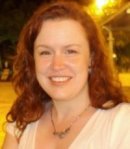Filed under: Interviews
 How did you become interested in the Fisk Jubilee Singers?
How did you become interested in the Fisk Jubilee Singers?
Elizabeth: I have been attending All Souls Church and singing with the All Souls Jubilee Singers since 1999. The music we sing moves me deeply. Unitarian church services can be very intellectual. We examine spiritual ideas from many sides, trying to make room for many interpretations. Oftentimes, the music transports me emotionally above and beyond the words of the sermon. The emotion in traditional African American spirituals is so clear – it transcends words. It provides a place for people to meet. Lenard Starks leads the All Souls Jubilee Singers and so much of what I know comes from singing under his direction.
The PBS Documentary, Jubilee Singers: Sacrifice and Glory came out in 2000 and my first reaction was to think “someone has to put this on stage!” From the first scene with Ella and her mother, to the moment on the train platform where their singing turns back the lynch mob – the story gripped me and I was surprised so few people knew of it. I bought the Andrew Ward book shortly afterwards. Lenard Starks and I talked about the idea. We were both inspired by it. The idea of doing a Jubilee Singers play was part of the impetus to start the KUUMBA Players in the first place. There was so much work to be done to begin the new theater group. It was too much to try and write this play at the same time. It was always there, a project I needed to grow into. In 2008, with the KUUMBA Players well established, I approached the other members of the steering committee with the proposal to research and write the play. Lenard gave me a wry smile “I thought we were going to do that 7 years ago,” he said. “Shoot, it was because of that project that I got involved in all of this in the first place.”
How did you research the play?
Elizabeth: I started with Andrew Ward’s incredibly comprehensive book Dark Midnight When I Rise. The research he did was amazing. I also traveled to Fisk University in the fall of 2008 to view the materials in their special collections. The librarian, Beth Howse, is a descendant of Ella Sheppard Moore. She showed me Ella’s journal, America Robinson’s letters, and many more treasures from the original singers. I attended Jubilee Day, the annual convocation where all of the Fisk University Community gathers in the chapel to honor the day in 1871 when the singers set off on the first tour. It was a powerful service. Afterwards, there is a procession in cars and everyone goes to visit the graves of the original singers who are buried within Nashville. The current Jubilees sing at their gravesides and they leave flowers. It was amazing to be among them.
There was so much material. I spent a lot of time researching. You have be careful about that, though. You can get lost there. At some point you have to set aside the research and start writing.
What was the most difficult part about writing the play?
Elizabeth: The actual story is so epic it could be a mini-series. How do you distill it down to a human-size drama that could work on stage? There are so many fascinating characters I couldn’t include. All good drama is rooted in human conflict. So much of the conflict in their story is about people up against impossible forces – racism and sexism and paternalism. They were incredibly brave in the face of so much hatred and poverty. But it’s not a novel. I’m not writing the Grapes of Wrath. As a play it must be rooted in human conflict, so how do you personify that? How do you show all of the things they’re struggling against, without getting impossibly abstract? That was the difficulty of it – doing that, while staying true to the story and keeping it under 2 hours.
1 Comment so far
Leave a comment
WHAT A DELIGHTFUL DEVELOPMENT FOR YOU—–SOUNDS LIKE A LIFE-DEFINING EXPERIENCE—–I’M SO EXCITED FOR YOU AND PROUD TO KNOW THE YOUNG WOMAN YOU HAVE BECOME——KEEP GOING——-CARVEL
Comment by carvel February 19, 2010 @ 12:01 pm